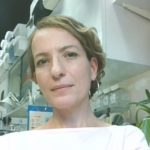Link to Pubmed [PMID] – 31911611
Link to HAL – pasteur-03922164
Link to DOI – 10.1038/s10038-019-0711-4
Journal of Human Genetics, 2020, 65 (4), pp.397 - 410. ⟨10.1038/s10038-019-0711-4⟩
Molecular diagnosis of rare inherited palmoplantar keratoderma (PPK) is still challenging. We investigated at the clinical and genetic level a consanguineous Tunisian family presenting an autosomal dominant atypical form of transgrediens and progrediens PPK to better characterize this ultrarare disease and to identify its molecular etiology. Whole-exome sequencing (WES), filtering strategies, and bioinformatics analysis have been achieved. Clinical investigation and follow up over 13 years of this Tunisian family with three siblings formerly diagnosed as an autosomal recessive form of Mal de Melela-like conducted us to reconsider its initial phenotype. Indeed, the three patients presented clinical features that overlap both Mal de Meleda and progressive symmetric erythrokeratoderma (PSEK). The mode of inheritance was also reconsidered, since the mother, initially classified as unaffected, exhibited a similar expression of the disease. WES analysis showed the absence of potentially functional rare variants in known PPKs or PSEK-related genes. Results revealed a novel heterozygous nonsynonymous variant in cadherin-12 gene (CDH12, NM_004061, c.1655C > A, p.Thr552Asn) in all affected family members. This variant is absent in dbSNP and in 50 in-house control exomes. In addition, in silico analysis of the mutated 3D domain structure predicted that this variant would result in cadherin-12 protein destabilization and thermal instability. Functional annotation and biological network construction data provide further supporting evidence for the potential role of CDH12 in the maintenance of skin integrity. Taken together, these results suggest that CDH12 gene is a potential candidate gene for an atypical presentation of an autosomal dominant form of transgrediens and progrediens PPK.


